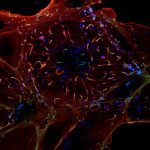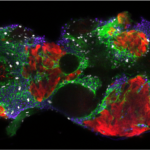The Biomaterials & Microfluidics core facility at Institut Pasteur is opening a postdoc position for development of an advanced lung microphysiological system. This project is developed in collaboration with multiple partners and will require interfacing with top-tier human immunology and virology labs within the 3D-LUNGO consortium.
The selected candidate will devise and implement a lung microphysiological system capable of reconstituting both alveolar and bronchiolar epithelial tissue mimics on the same microfluidic device. The project will benefit from human lung organoid cultures that are already established in the lab. Ultimately, the produced organs-on-chips will be used to document the progression of viral pathogens along the respiratory tract and to test various hypotheses with regards to the physiopathological mechanisms at play.
The candidate will implement a bronchiole-on-chip and a pulmonary alveolus-on-chip, building on the expertise of the facility in microfluidics and on human lung organoid cultures that are already established in the lab. In the following stage, the candidate will devise a dual bronchiole/alveolus-on-chip system, to better document the progression of viral pathogens along the respiratory tract.
- Activities
The successful candidate will have to engineer a microfluidic organ-on-chip system with interconnected compartments. She/He will have to establish protocols for differentiating multipotent epithelial cells into fully functional airway and alveolar epithelia-on-chip. Quantitative assessments will entail confocal/lightsheet imaging, immunostaining, transcriptomics and various functional assays. The selected candidate will oversee the design of experiments, run the assays, perform the analyses and give regular feedback to the entire consortium.
- Knowledge & skills
A good expertise in the fields of microfluidics chip design is required. Prior experience with organ-on-chip assays and/or primary airway or lung cell culture will be a strong plus. The candidate should be interested in the development of technology for biomedical research. She/He should be capable of efficiently interfacing with scientists across multiple labs specialized in quantitative imaging, biophysics, and infectious diseases.
- Education
The candidate should have a PhD degree in bioengineering or lung biology, with a good publication record. Good knowledge in epithelial cell biology will be a plus.
Applicants should send their CV, a summary of previous research experience and if possible, the names of two references to Samy Gobaa (bmcf.admin@pasteur.fr)
Funding body: PEPR-MIE (ANRS). Duration:24 months with options for extension.




